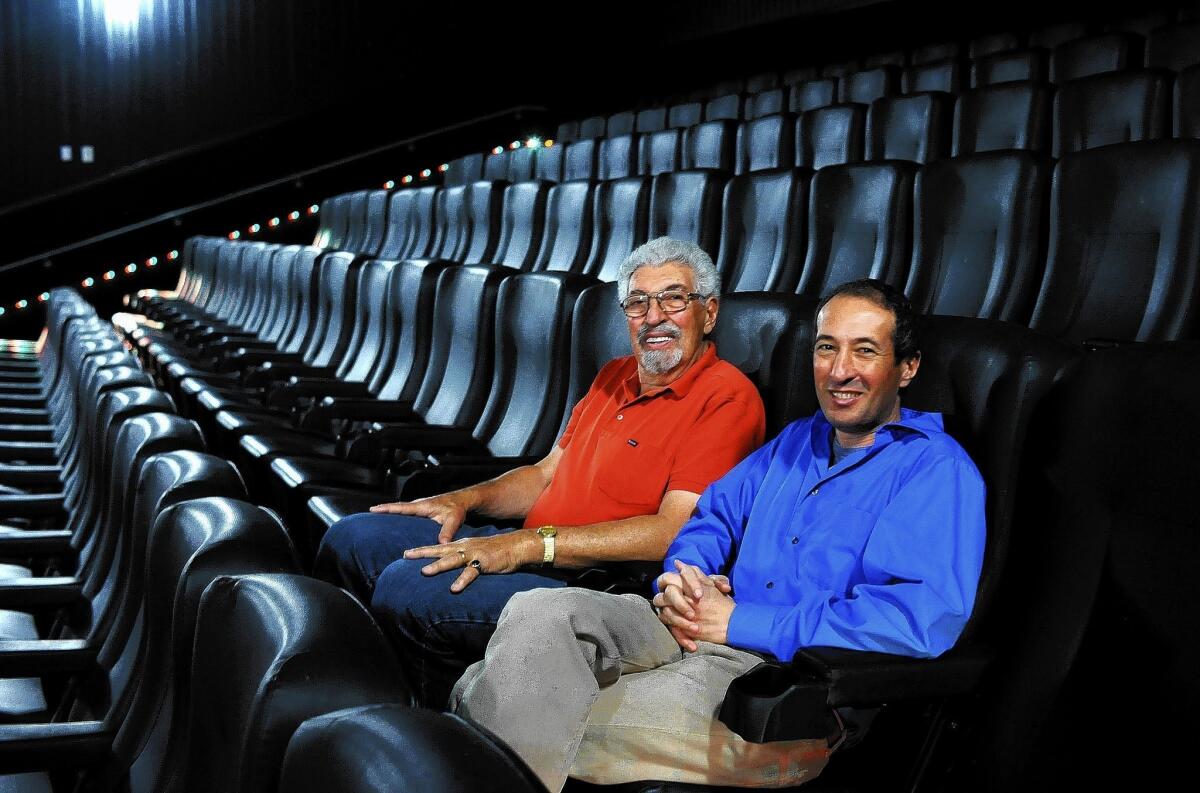Laemmle Theatres calls off sale as its historic Music Hall location shuts down

Los Angeles-based cinema chain Laemmle Theatres, best known for showcasing art-house movies and foreign gems, is taking down the “for sale” sign after months of seeking a buyer.
The development came on the same day the family-owned company closed its historic Music Hall location in Beverly Hills.
Greg Laemmle, 54, president of the eight-decade-old exhibitor, broke the news to staff in an 11 a.m. call on Thursday, the last day of operations for the Music Hall.
The company, which now has seven locations, has been on the block since summer. The owners began to pursue options during a steep downturn in box office revenue.
For the first six months of 2019, box office for Laemmle theaters was down as much as 30%, Laemmle said, in a dramatic sign of the struggles of the specialty cinema industry. Business has improved in recent months, but ticket sales for the year are still expected to be down between 10% and 20%, he said.
“We don’t want to react to short-term trends,” Laemmle said in an interview. “But for us, something that goes on for more than six months becomes more than a short-term trend.”
The circuit attracted interest from multiple possible buyers, including other theater chains, Laemmle said. Some speculated that potential suitors would include Regency Theatres and Landmark Theatres, the latter of which sold to New York real estate billionaire Charles S. Cohen about a year ago.
However, the sides could not come to an agreement on terms, such as price.
“While there are risks to continue owning and operating the business, the reward of continuing was greater than the reward of selling, ultimately,” Laemmle said. “Part of that reward is doing what we do.”
The chain has been family-owned and operated for three generations, starting when brothers Kurt and Max Laemmle, nephews of Universal Pictures founder Carl Laemmle, founded their theater business in 1938. Greg Laemmle’s father, Robert Laemmle, 84, is the son of Max Laemmle.
Currently, the circuit includes locations in Claremont, Glendale, Santa Monica, North Hollywood, Pasadena, West Los Angeles and Encino. Until recently, the company also operated the Fine Arts Theatre in Beverly Hills.
The firm has about 200 employees, including 60 to 70 full-time staff.
Laemmle has operated the Music Hall theater since 1974. The location opened in the late 1930s, putting it among the oldest movie houses in Los Angeles. The three-screen theater, which largely played little-known indie titles, has lately fallen into disrepair.
The combination of struggles at the box office and rising rents put increased pressure on the location. Ultimately, it no longer made sense to keep it open, Greg Laemmle said, adding that he expects some of the theater’s staff to be transferred to other locations.
“We feel we can cover much of the programming that played at that theater in other locations,” he said. “It was better to bite the bullet, finally, and get ahead of the curve on it.”
He said he does not anticipate any other theater closures through the end of 2020.
The company is moving ahead with its long-in-the-works Newhall multiplex, Laemmle said. The seven-screen theater, which has suffered delays during construction, is expected to open early next year, he said. The company is also still developing locations in Azusa and Bellflower.
Independent cinema chains have struggled to stay afloat in recent years as the business consolidates and box office becomes increasingly concentrated among a handful of Hollywood franchises.
It’s increasingly difficult to get moviegoers interested in smaller titles, and little chains face competition from giants such as AMC and Regal that also play specialty films in their multiplexes. Additionally, the type of high-quality filmmaking that was once the bread and butter of indie studios has increasingly gravitated toward streaming services and prestige television.
Still, art-house cinemas are hoping the influx of potential awards contenders will lift the indie box office in coming weeks as 2019 comes to a close.
“The market has improved, which gives us some flexibility on some level,” Laemmle said. “I never thought what we were seeing was a fundamental change in audience’s interest in moviegoing.”
More to Read
Inside the business of entertainment
The Wide Shot brings you news, analysis and insights on everything from streaming wars to production — and what it all means for the future.
You may occasionally receive promotional content from the Los Angeles Times.











